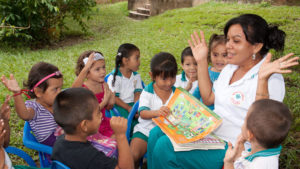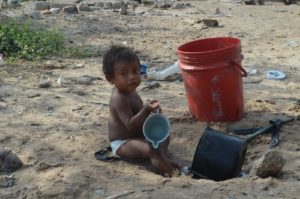In Colombia, poor and abandoned children die by the dozens each year, and it’s corruption that’s killing them
The abandoned children range from infants to kids in their teens. In one particular commercial there’s one as young as three months. Her name is Salmoné, and she is dressed in a pink and white polka-dot smock with a red wine coloured bow on the front of it. Two white barrettes hold in place her short but full dark hair. She has chubby cheeks and looks well cared for. All of the children’s full names, ages and parents’ names are given, but too often it says “not registered” in the father category.
Cartoonish butterflies and doves flutter around their faces while way-too-cheery, almost mocking music plays in the background. Despite the obvious miscalculation of mood and tone, the song’s lyrics are haunting – “You know me, look at me, or maybe you know my father, mother or grandparents. I want to feel joy, it’s time to find them…”
These are Colombia’s abandoned children, and the commercials are made by the Instituto Colombiano de Bienestar Familiar (ICBF), or the Colombian Family Welfare Institute. Maybe you’ve even seen their TV spots on one of the two main networks during the afternoon or evening news. They air every day, and every day they have new children on display. In this country, there is no shortage of children who are given up by their mothers for one reason or another, but more often than not, it is because they are teenaged girls who had unprotected sex, got pregnant, and are from poor backgrounds. They have no way of supporting a baby, and in many cases, barely live more than a hand-to-mouth existence themselves.
When this happens, the young mothers must make what can only be the hardest decision of their lives. One that must haunt them until their last day on Earth; to find the nearest Family Welfare Institute and put their child in the hands of the country’s state-sponsored orphanage.

An ICBF Community Mother seen teaching a group of small children.
From there, abandoned children’s lives are not likely to get any better. The agency tasked with caring for the nation’s unwanted kids has seen its budget slashed as the government implements what it likes to call “intelligent” austerity measures designed to compensate for the drop in oil prices, and subsequent drop in its budget. No expense has been spared, not even welfare programs designed to protect the country’s most vulnerable children.
This situation has gotten so bad that 7,000 of the nation’s so-called community mothers – the women who take care of the hordes of unwanted children around the country – went on strike in April last year over concerns that the worsening conditions from the dwindling resources has led to malnutrition. The strike came to an end 11 days later after the government agreed to meet some of the community mothers’ demands.
Dozens Starve to Death Every Year
But the neglect at meeting the needs of the poorest children goes far beyond the purview of the overwhelmed, underfunded, mismanaged, and historically corrupt Family Welfare Institute – with fatal consequences. More than 100 children in Colombia died of hunger and thirst last year, and 64 of those were indigenous children in the drought-prone and poverty-stricken province of La Guajira. So far this year, 89 children have perished from illnesses associated with a lack of food and water, all of whom were under the age of five, and 68 percent did not reach their first birthday.
The inability to keep children from starving to death has a social dimension. In this staunchly-Catholic country, family planning is almost non-existent, and pregnancies are rarely planned. Colombia has the dubious distinction of being No. 1 in the world in terms of children born outside of wedlock, and by a vast majority; 84 percent of all children here are born to unwed mothers, according to a study released by the NGO Child Trends. At only 11 percent, Colombia leads Latin America with the highest percentage of children living without either of their parents. And at just 20 percent, the country also leads the world in adults of reproductive age who are unmarried.

An unidentified Wayuu indigenous child seen in a village near Riohacha, La Guajira province. A combination of poverty, drought and widespread corruption has led to the deaths of dozens of children in the region.
But the real harm comes from those whose greed takes food out of hungry mouths. People like Oneida Pinto. She is a former governor of La Guajira, and the ex-mayor of Albania municipality in that province. In 2011, while she was a candidate in the mayoral election, Yan Keller Hernandez – the serving mayor at the time and a close political ally of Pinto’s – signed a contract worth $18.6 billion pesos ($6.3 million USD) with the San Rafael Hospital of Albania. The hospital’s central objective was to reduce infant mortality rates.
According to the Prosecutor’s Office, Pinto used some of that money for her mayoral campaign and embezzled the rest. She did this by allegedly parceling out small contracts to 1,600 underqualified subcontractors to carry out tasks such as giving talks to indigenous communities about how to avoid malnutrition, and visiting pregnant mothers to talk about preventing starvation. Each of them was paid around $400 USD for their work (totaling $640,000 USD in all). One thing all 1,600 subcontractors had in common was that they lived in Albania municipality, and in 2012, Pinto was elected mayor. Since then, 11 of those involved in the mermelada scheme have been arrested, including the former mayor Yan Keller Hernandez.
In March this year, Pinto was arrested and currently sits in a jail cell in Bogota pending trial. She faces charges of embezzlement by appropriation, issuing contracts without compliance with legal requirements, undue interest in the conclusion of contracts, and falsification in public and private documents. Naturally, she has denied all the charges.

Former mayor and La Guajira governor Oneida Pinto.
She was moved from La Guajira to the capital and remanded in custody on the grounds that she would likely use her political influence to “interfere with the course of justice,” as they call it, and with good reason. She is a member of Vice President German Vargas Lleras’ Cambio Radical (Radical Change) party and the two used to be political allies. Vargas Lleras has since distanced himself from Pinto, and just this week announced he’ll be running for president next year.
Corruption on a Grand Scale
That anything in this country where state funds are involved is riddled with corruption goes without saying. It doesn’t matter that the funds, in this case, are intended for feeding starving children. Pinto isn’t the first official to line her pockets with public money for hungry kids, and she won’t likely be the last. Last year, 12 Family Welfare Institute officials were arrested in the coastal city of Barranquilla, Atlantico province, including an ex-director by the name of Yolanda Ruiz. The dirty dozen were charged with embezzling $600 million pesos (more than $200,000 USD) from funds that were supposed to go to feeding the more than 1,100 children in their care.
In 2015, 14 Family Welfare Institute officials were arrested in La Guajira province on similar corruption charges. The list of scandals, criminal charges and investigations into overt robbery, embezzlement, fraud schemes, or giving favourable contracts to friends and political allies stretches back for as long as the Institute has been in existence.
RELATED: Colombia’s Fictitious Justice System
One nurse, who wished not to be identified, told MiKo that she got a job at a Family Welfare Institute in the town of Cajica in 2008, and worked at the centre for about a year and a half, before quitting in disgust at what she had witnessed there. The director said the 100 people under their care would have to make do because of supposed “cutbacks.” Social and physical activities for the 50 children and another 50 mentally challenged adults had to be scaled back, and even hot water for showers was cut off.
The centre’s director – the same woman who was responsible for handling and administering the funds – took a month-long trip to France. The nurse also said that she stuck it out the longest of all the other caregivers there. Her last colleague left and, for a time, she was the only one there to feed and provide structure and activities for 100 people, when there were supposed to be at least 12 caregivers on site at all times. The nurse felt guilty for being the last holdout to leave these people to their own devices, but was comforted by the thought that most staff would be replaced, eventually, when the director got back from her holiday.
The nihilistic greed-fest goes up and down the chain of command. Even Cristina Plazas, who was the head of the Family Welfare Institute until August 2nd this year, cannot wash her hands of cesspool of corruption that took place under her watch – though that doesn’t stop her from trying. She loves to cast herself as a crusader against corruption within her organization. Unfortunately, saying as much was not enough for her to escape scandal.

Former ICBF director Cristina Plazas.
“I cannot say that I ended all the corruption in the ICBF because [people have been] plundering this entity for many years, but we did structural changes that allowed us to improve,” Plazas meekly argued a few days before she was pushed out of the position by the Ministry of Finance. “There are still criminal companies that were created in order to steal resources meant for the children, so we must continue to say ‘no’ to political quotas.”
Her ineptitude caught up with her at an extremely inconvenient time in February last year. When Plazas was set to walk down the aisle, her fiancé Eduardo Benavides was arrested on charges of using his influence to illegally obtain a ranch that was once owned by an associate of the infamous drug baron Pablo Escobar. Colombian prosecutors broke up the wedding after they found evidence that Plazas’ husband-to-be used his position in the now-defunct government agency in charge of overseeing seized properties, to sell them to friends and business partners at rock-bottom prices.
The arrest that ruined Plazas’ wedding day was just another one of the string of embarrassments for the Family Welfare Institute. Nevertheless, the embattled former director has not personally been brought to charges, even while children went hungry, starved and died on her watch.
Light on Lunch
But it’s not just the Family Welfare Institute that is criminally negligent enough to take the blame for all those dead children. In April last year, Colombian prosecutors opened an investigation into three contractors responsible for overseeing a large-scale school lunch programme on the Caribbean coast after a video surfaced showing different children posing with the same plate of food and plastic cup of juice, while a woman takes photos of each of them to give the impression that each child was being sufficiently fed.
This video showing multiple students being photographed with the same plate of food prompted an investigation into a misallocation of state funds aimed at feeding school children.
Two of the three women who held a monopoly over how those funds were spent, Leda Guerrero and Adiela Alvarez, were accused of setting up foundations to secure public funding and then embezzling and laundering funds, to the tune of $11.4 million USD. The pair were responsible for providing food to more than 120,000 children in 49 municipalities in the north of the country, but most children left school hungry, while Guerrero and Alvarez mysteriously became over-night millionaires. A third woman by the name of Katia Rosado, has also been accused of involvement in the multimillion dollar funding heist, but she has not only denied involvement but also denied being involved in the school food programme altogether.
The capture in early August this year of Básima Elías, another person involved in the plundering of state funds meant for children, had this to say about Leda Guerrero: “I knew to be a cleaner for the Family Welfare Institute … nowadays she has a large mansion that is worth about $5 billion pesos ($1.7 million USD).”
As for Adiela Alvarez and Katia Rosado, it appears they were crafty enough to evade arrest and are currently on the lam. Even after all the accusations against her, Ms. Alvarez had the gall to appear on Noticias Caracol last year and claim that she was nothing more than a nutritionist. How she suddenly came into a large sum of money is probably of interest to the Prosecutor’s Office, as is the whereabouts of Ms. Rosado.

The so-called “Zarinas de Alimentacion”, from left: Adiela Alvarez, Leda Guerrero, and Katia Rosado.
Sound familiar? It is truly horrifying that those who are charged with feeding the country’s most vulnerable and defenseless would allow them to starve to death so that they could personally pocket the money. What is perhaps most sickening is that, despite the multiple arrests and prosecutions, the practice has been allowed to proliferate, and continues to this day.
Sure, there was rightful indignation and a public outcry that prompted the Prosecutor’s Office to open dozens of investigations against a web of corruption that spans the length and breadth of the country. While these cases are ongoing, children continue to starve to death, or die from complications related to malnutrition. Hundreds fewer children are alive today because of this wholesale corruption that sadly defines childcare in Colombia. There are four more months left in 2017. How many more kids will die as each investigation lumbers along? How many more will wither away before those whose greed and self-interest that caused this crisis are convicted and sent to prison? And shouldn’t mass murder be added to the list of charges they face?
I have not heard of any of the cases advancing, and few are being sent to prison for having a hand in the deaths of dozens of poor, unwanted and abandoned children. Colombian indignation is as fleeting as it is fickle. Everyone who gets to read this, as well as its writer, are privileged enough not to know hunger, and like most of us who “won the lottery” and were born into families of means, we tend to take that for granted. Too often the poor and unwashed, the addict, the mentally ill, the pick-pocket and the garbage recycler are blamed for their station in life. For the rest of us, if we get to live our lives long enough without dying, getting killed, or killing ourselves off, we get to fuck life up on our own terms, and to settle into a comfortable and long-lasting regret.
But too many of us aren’t lucky enough to make it that far. Too many will never get to care about such things because they don’t have that luxury. They will grow up and spend their lives worried about where their next meal is coming from… if there is a next meal… while the soulless and the corrupt fatten themselves on French pastries during fancy holidays.

Journalist. Misfit. Malcontent. Provocateur. Is a better Colombia is possible? We’re starting to have doubts.


A very interesting but sad article, Colombia believes that it is no longer a ‘Third World Country’, people only have to read this to know that Colombia still has a long way to go before it can be classed as civilised…the mermelada culture here, is killing a wonderful country, but you cant just blame the Government and those Authorities responsible, the people of this country have to stand up and say ‘No More!’, they have the opportunity next year, at the Elections, but will they, or will they be bought, yet again?